How AI is Shaping the Future of Sales Proposals
And how to take advantage of it early on.
— Propoze
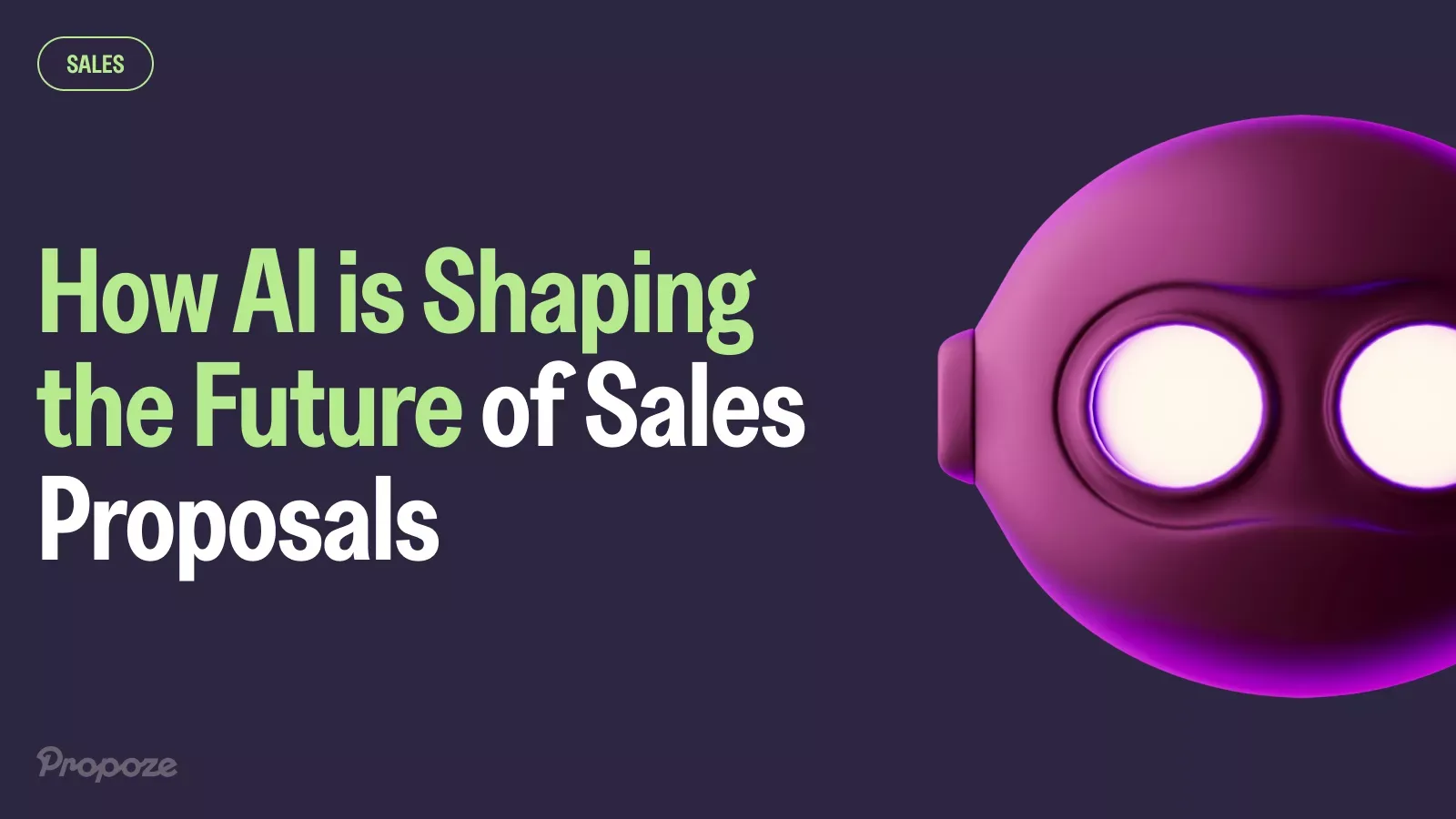
AI is rapidly shaping the future of sales proposals, transforming how we approach this important task.
With AI, companies can now draft proposals faster, with greater accuracy, and tailored to specific client needs.
This shift not only doubles down on efficiency but also allows for more personalized, compelling proposals that resonate with clients.
In this post, we'll explore how AI is revolutionizing the proposal process and what it means for the future of sales. Whether you're a small business or a large enterprise, understanding this change is key to staying competitive.
Let’s start from the beginning — how did AI even get this big in the proposal industry?
The evolution of AI in proposal writing
AI has dramatically reshaped the way businesses approach proposal writing.
In the start, AI tools focused on automating repetitive tasks like formatting and data entry, which sped up the process but didn’t add much in terms of creativity or strategy.
However, as AI technology advanced, its role in proposal writing evolved from simple automation to a more intelligent, strategic function.
Below, you can see how proposal teams are already using AI in their proposal creation process. Interestingly, almost half of them are using AI to create their first draft!
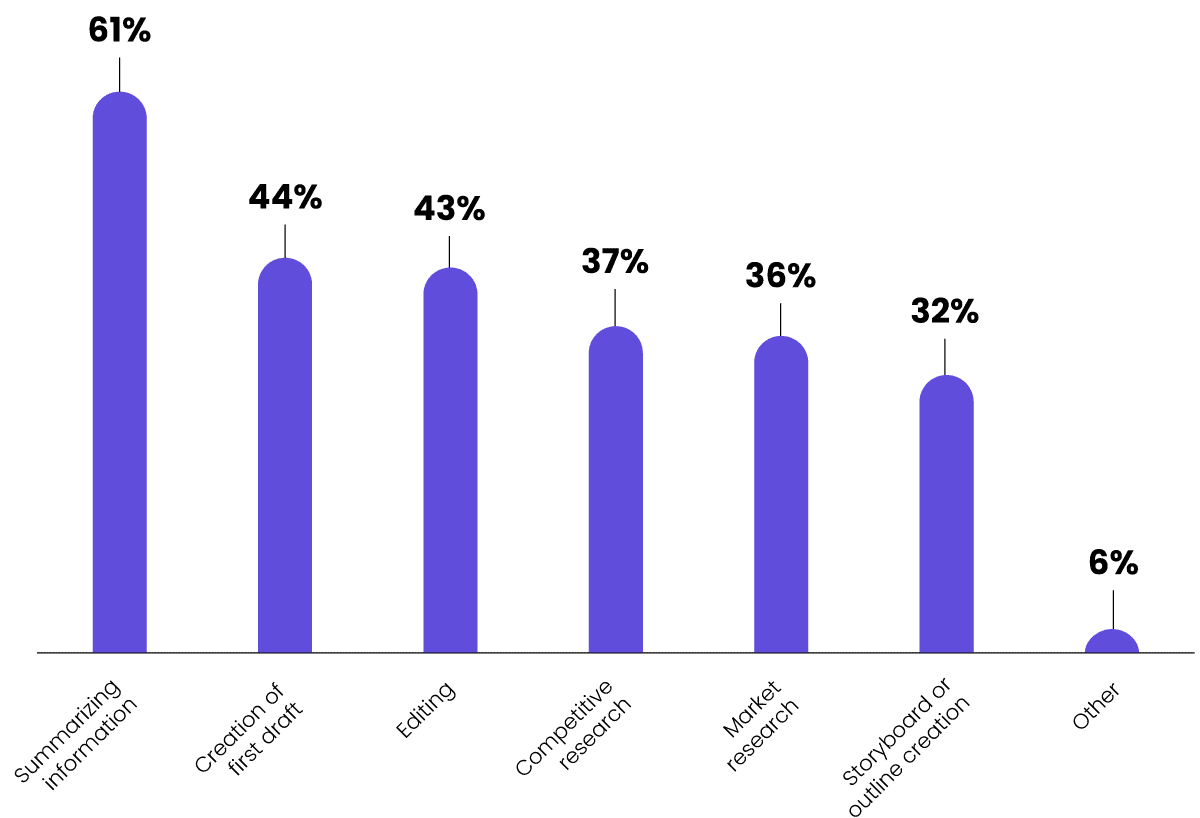
Modern AI tools do much more than just handle mundane tasks — they analyze large chunks of data, such as client preferences, industry trends, and past proposal performance, to offer deeper insights.
This allows businesses to create proposals that are not only faster to produce but also more targeted and effective.
For example, AI can now suggest content tailored specifically to a client’s needs by analyzing previous interactions and similar successful proposals. It can adjust the tone, language, and structure of a proposal to align with what is most likely to appeal to the client, making each proposal more personalized and compelling.
And that capability in itself is incredibly powerful. It’s like having an experienced sales expert guiding you through the entire proposal process.
Even better, AI tools can predict the potential success of a proposal by examining various factors, such as the client’s past decisions, market conditions, and the competition.
This predictive capability helps us refine our proposals before they’re even sent. Thus, increasing the chances of winning the deal.
One thing is sure — in the near future (1-3 years), we can expect even more sophisticated tools to help us with:
- Real-time feedback during proposal drafting
- Fully-automated proposal generation
- Instant personalization of the proposal
There’s much more… It remains to be seen what type of breakthroughs will happen in the AI space, and how that will affect the proposal industry.
But we do know — it will become much easier and faster to create winning proposals.
And we’re all for it.
From automation to intelligent drafting
AI's early role in proposal writing was simple: it automated repetitive tasks like formatting and organizing data.
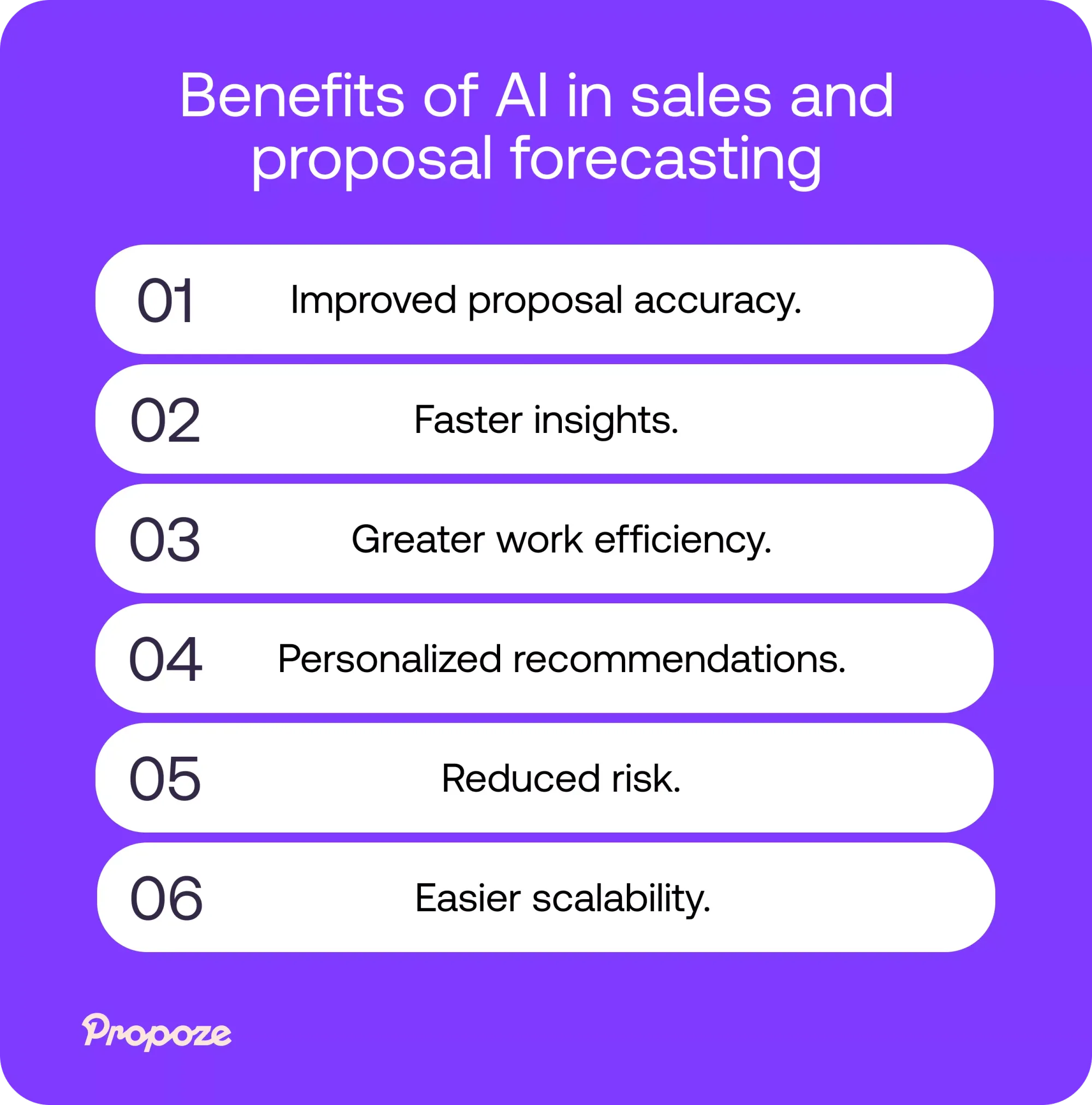
This saved time but didn’t enhance the quality of content. As AI improved, it began helping with drafting by suggesting content based on client information. These tools could pull data and pre-fill sections, but proposals still needed manual adjustments for personalization.
Today, AI takes things further by analyzing client preferences and past successes to generate personalized, structured proposals. This shift from basic automation to intelligent drafting allows for more accurate, targeted proposals that require less manual work.
How AI has transformed the proposal landscape
Until recently, proposal writing has been a manual, labor-intensive process. Between gathering and producing data, that usually takes some number of hours to accomplish. AI automates much of the work today, freeing up teams to strategize instead of actually carrying out tasks.
Visier conducted a research where they found out that 29% of respondents say that generative AI tool save them 30-60 minutes in an average day — and 18% of them say that these tools save them approx. three to four hours a day.
The biggest difference is in personalization. AI tools know how client data, industry trends, and past interactions are churned out in proposals, with more relevance and targeted toward clients' needs.
The personalization level that would have taken hours if set out manually becomes achievable within minutes with AI. By truly comprehending the preferences of clients and their business goals alike, AI ensures every proposal speaks directly to the client's needs, securing an increased chance of success.
AI also made the whole proposal process a lot easier by making the process more accurate.
This is because a large portion manual inputs result in errors, such as outdated information or a mismatch in the format used. AI reduces these errors by fetching accurate and updated data directly from CRM systems or databases.
Instead, this saves more time and enhances professionalism, adding to the reliability of proposals.
Another game-changing AI feature in proposals is the capability for real-time insights provided. AI tools can track how clients engage with proposals-whether they spend more time on specific sections or share the document with others.
These valuable insights enable businesses to refine their proposals to better address client concerns and emphasize the most critical aspects of their service offerings.
In short, AI has reshaped the proposal development landscape by automating routine tasks, personalizing the service to a greater degree, reducing the number of errors made, and offering valuable data-driven insight. Proposals are fast becoming more effective, efficient, and sensitive to clients' needs as more businesses employ these tools.
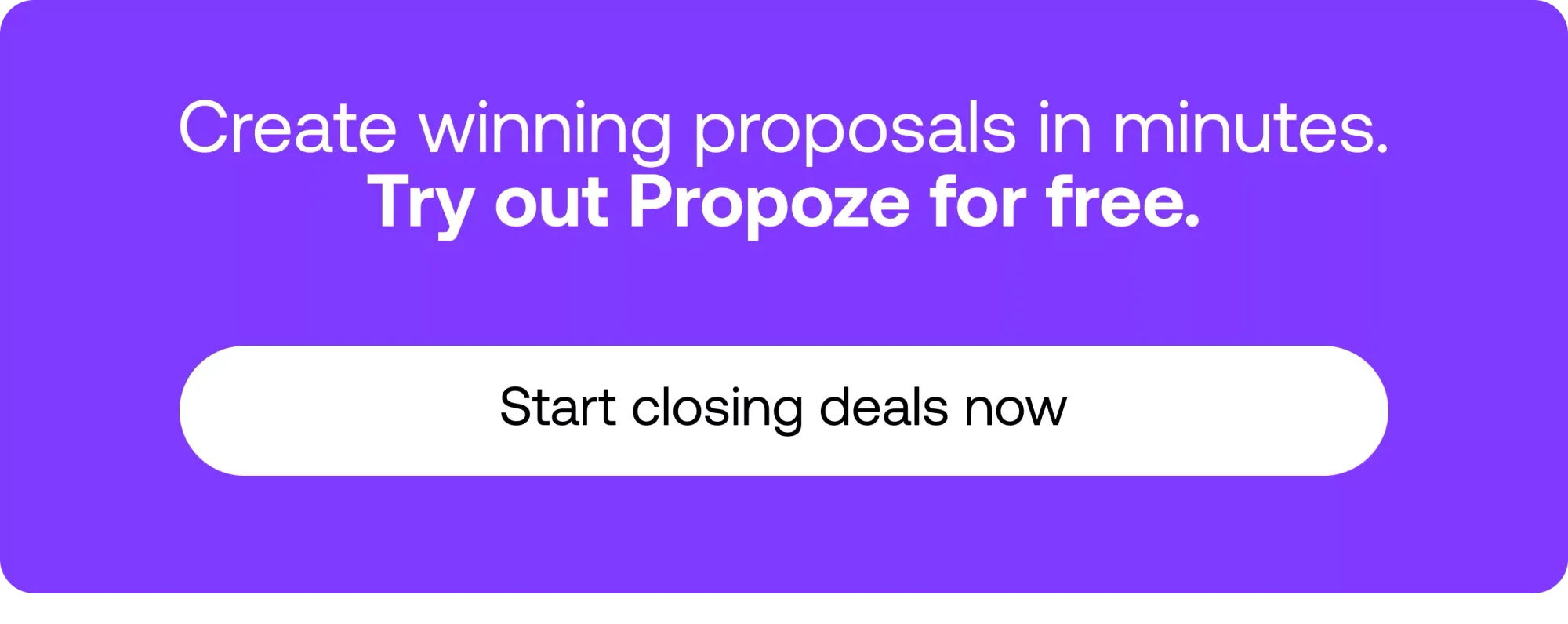
Key benefits of using AI in sales proposals
AI is disrupting how sales teams approach proposal writing. In turn, it's implementing elements of speed, personalization, and efficiency into the process.
Rather than wasting hours working monotonously, it's now the heavy-lifting job of AI, leaving much free time for the team to strategize and be creative. Of course, this gives way to a number of tailored proposals that cater to the requirements of each client, which lessens the number of errors, thus enhancing quality in general.
On top of that, AI provides a bunch of insight on how clients interact with proposals so businesses can adjust their approach every time. With AI, a sales proposal is not only easier to create, but also wiser and more effective in bringing you closer to closing.
Benefit #1: Reducing the proposal creation time
Proposal tools like Propoze, PandaDoc, and Qwilr have revolutionized the speed at which sales proposals are created. They automate time-consuming tasks such as formatting, data entry, and pulling client information from CRM systems.
This not only ensures that proposals are accurate but allows them to be tailored to each client’s needs in minutes. Additionally, features like real-time collaboration make it easier for teams to work together, even remotely, reducing delays caused by communication gaps.
Just consider a traditional manual process, where gathering client data, organizing content, and formatting could take several hours or even days. With AI-driven automation, the entire process can be condensed into a fraction of the time — typically within 30 minutes to an hour — allowing businesses to be more responsive to new opportunities.
Features that heavily impact the proposal creation time:
- Templates: AI proposal tools offer a library of customizable templates, eliminating the need to start from scratch.
- Automated data input: CRM integrations pull in the latest client information, ensuring data accuracy.
- Version control and tracking: AI tools ensure the latest version is always accessible and track client engagement once a proposal is sent, offering actionable insights on when to follow up.
By significantly reducing proposal turnaround times, AI helps sales teams to focus on higher-value tasks, such as strategizing and client relationship building, while still delivering top-tier proposals that are professional and precise.
This ability to respond faster without compromising quality gives us a competitive edge, particularly when dealing with time-sensitive matters.
Benefit #2: Proposals are more accurate and consistent
AI tools make huge strides in making the proposals not only highly accurate but also consistent.
Human error used to be a very prevalent thing: something was outdated, the format was uneven, or something wasn't noticed that caused the error to occur.
AI reduces these same oversights by pulling real-time data from integrated CRM systems, which ensures information is current and accurate at all times.
Secondly, AI-powered platforms utilize templates that enforce consistency across all proposals, from branding elements to structure. This helps ensure that all proposals are to the company's standards for professionalism, saving a lot of time from continuous revisions.
Here’s an example.
Automated error-checking tools flag inconsistencies or missing information so you can fix them before proposals go out. Reduces back-and-forth communication for corrections and speed up the process.
And the result?
Teams, by using AI, ensure that their proposals are more exact and consistent, polished, and reliable to instill confidence in the clients and hopefully avoid mistakes that may lead to losing a probable deal.
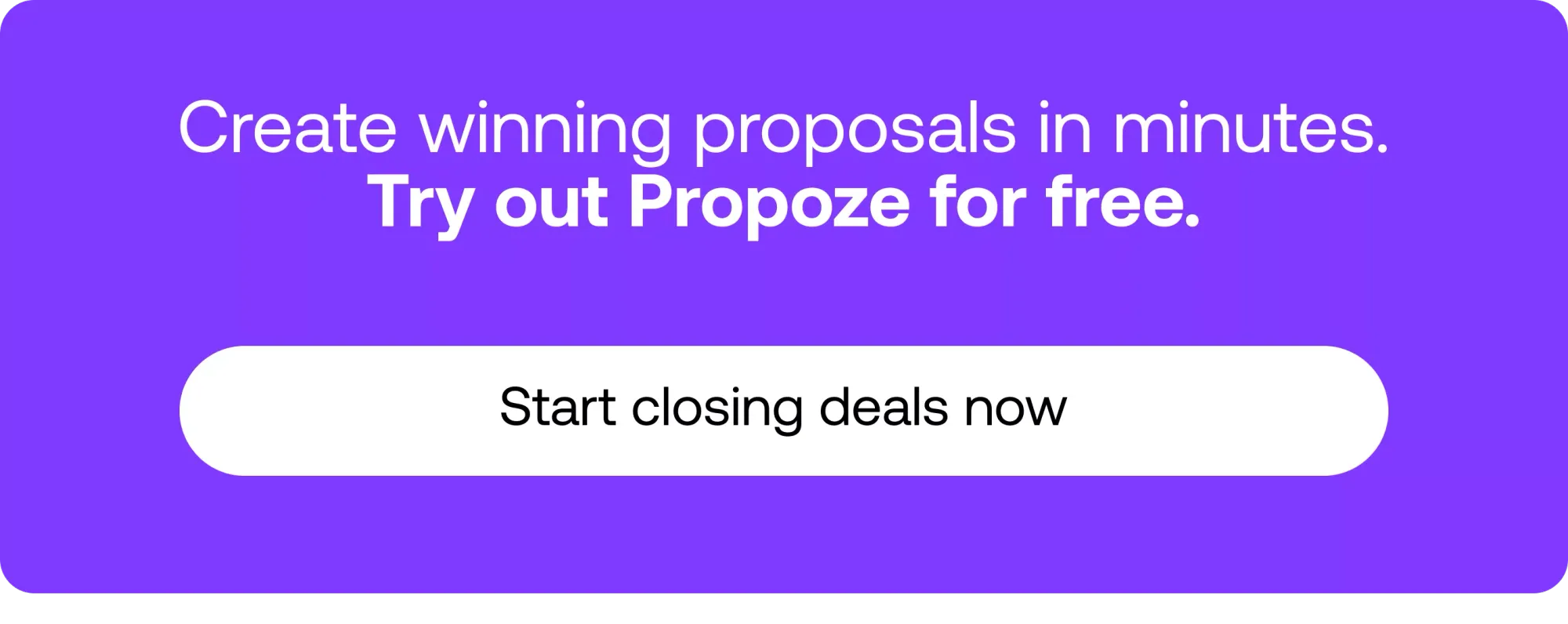
Benefit #3: Proposals are easily tailored to client needs
AI allows businesses to personalize proposals at scale, something that would have been incredibly time-consuming with manual methods. By analyzing client data — such as past interactions, preferences, and pain points — AI can customize each proposal to meet individual needs while still automating much of the process.
This ensures that every client receives a proposal that feels explicitly tailored to them, without requiring extensive manual input.
How it works:
- Client-specific content: AI pulls data from CRMs to insert personalized details.
- Custom messaging: Adjusts tone and language to fit client preferences.
- Dynamic templates: Automatically adapts sections based on client needs, industry, or deal type.
This level of personalization increases client engagement and makes proposals more compelling, ultimately improving win rates.
Practical applications of AI in proposal writing
AI has transformed the proposal writing process, offering several practical applications that improve efficiency and quality:
- Automating content generation: AI can draft sections of proposals, like introductions or company overviews, saving time on repetitive tasks.
- Data-driven personalization: By pulling client-specific data from CRM systems, AI customizes proposals to suit individual needs.
- Proposal analytics: AI tools track client interactions with proposals, providing insights on engagement and highlighting which sections are most viewed.
- Real-time collaboration: AI-driven tools enable team members to work on proposals simultaneously, improving productivity.
These practical applications help businesses produce higher-quality proposals more efficiently.
Tools to watch: The top AI proposal platforms in 2024
As AI advances, several platforms have emerged as leaders in automating and enhancing the proposal creation process. Here are some of the top AI-driven proposal platforms to watch in 2024:
#1 PandaDoc
PandaDoc excels at document automation for larger teams, integrating with CRMs and offering e-signatures, document analytics, and automated workflows to streamline proposal management.

Best for: Document automation and large teams.
Key features: CRM integration, e-signature capabilities, and extensive analytics. PandaDoc helps streamline every step of the proposal process, from creation to closing deals with automated reminders and follow-up features.
Why it stands out: Provides a robust suite of features, particularly for larger teams needing collaboration tools and document tracking across multiple departments.
#2 Qwilr
Qwilr turns proposals into interactive web pages with embedded videos and dynamic pricing, perfect for businesses focused on visually engaging, branded proposals.

Best for: Visually-driven proposals.
Key features: Transforms static proposals into interactive web pages, with features like embedded videos, dynamic pricing tables, and brand customization.
Why it stands out: For businesses focused on creating visually compelling proposals, Qwilr offers a sleek, modern platform that allows for more engaging client experiences.
#3 TextCortex
TextCortex supports over 25 languages, making it ideal for international teams needing multilingual proposals, with AI-powered templates for smooth content adaptation.
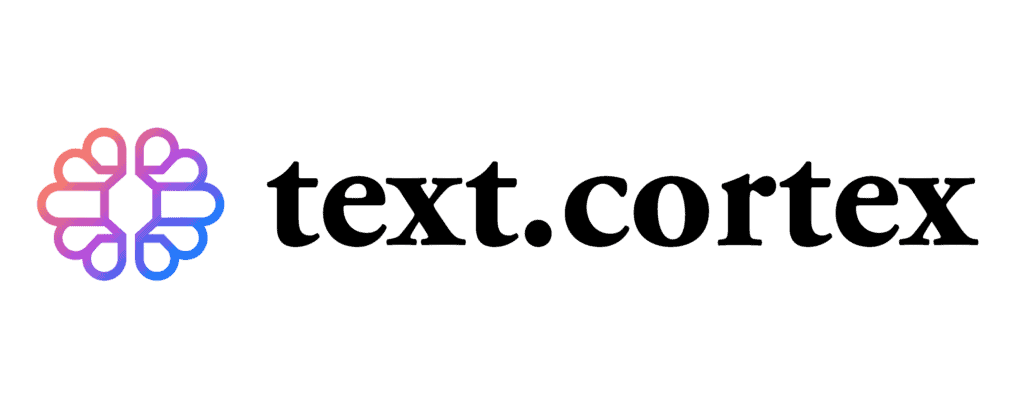
Best for: International teams and multilingual proposals.
Key features: Supports over 25 languages and includes over 60 AI-driven writing templates, making it an excellent choice for companies dealing with global clients.
Why it stands out: It excels in adapting content for different markets, ensuring a smooth process for international collaborations.
#4 Simplified
Simplified offers AI-powered content creation tools, making it a great choice for teams focused on scaling creative proposal writing with integrations like WordPress.

Best for: Proposal ideation and content creation.
Key features: Includes AI-powered tools for generating long-form content and persuasive bullet points. Supports integration with platforms like WordPress, helping businesses scale their content creation for different use cases.
Why it stands out: Combines content creation tools with powerful AI capabilities, helping businesses generate more engaging and strategic proposals with ease.
These platforms bring different strengths to the table, depending on your business needs—whether you're looking for speed, visual impact, or comprehensive analytics. Incorporating AI tools like these can streamline your proposal process, improve client engagement, and help your business stay ahead in a competitive market
#5 Propoze
Propoze is ideal for small businesses and freelancers, offering customizable templates and real-time tracking. Its easy-to-use drag-and-drop editor simplifies creating personalized proposals.
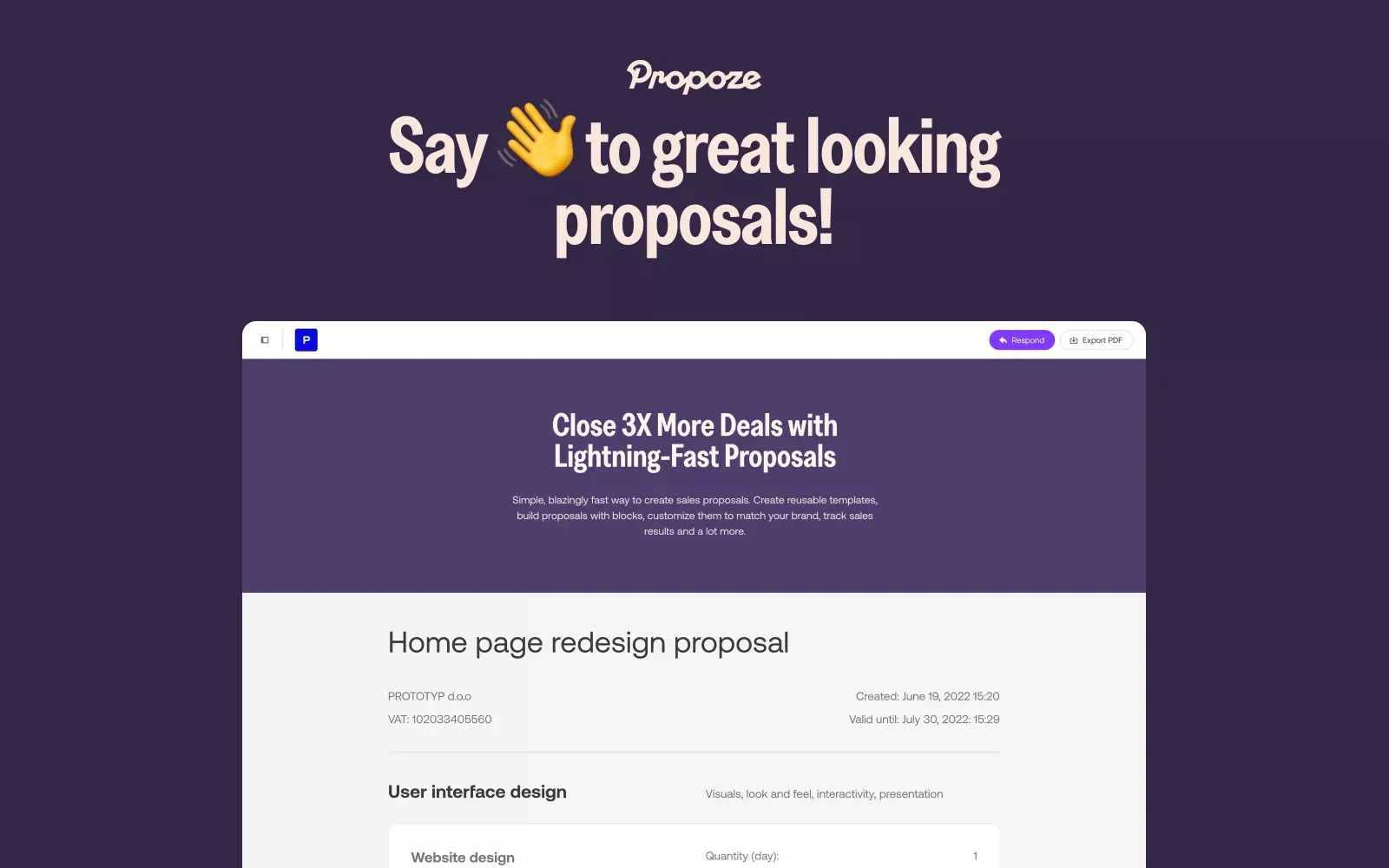
Best for: Small businesses and freelancers.
Key features: Customizable templates, real-time tracking of client interactions, and an intuitive drag-and-drop editor make Propoze ideal for creating personalized proposals quickly and efficiently.
Why it stands out: It offers a user-friendly interface specifically tailored for those looking to simplify the proposal process with minimal setup.
How will AI-powered proposals change in the next 5 years? Here’s our prediction
In the coming years, we expect AI to dramatically advance the way sales proposals are created and managed.
Here are a few of our predictions on how AI will shape the future of proposals:
- Greater personalization: AI will continue to refine its ability to craft highly personalized proposals. By analyzing deeper client insights, such as previous interactions, preferences, and business needs, AI will produce hyper-targeted proposals that resonate with clients on a more personal level.
- Predictive analytics for success rates: AI-driven predictive analytics will become more accurate and sophisticated. Sales teams will not only have better insights into the likelihood of winning a deal but will also get recommendations on how to adjust proposals to increase their chances of success.
- More human-like proposal drafting: With the advancements in Natural Language Processing (NLP), AI-generated content will become increasingly indistinguishable from human writing. AI will offer contextual suggestions, improving the overall tone and making proposals feel more natural and less machine-like.
- Fully automated proposal creation: Over time, AI will be able to handle the entire proposal creation process from start to finish. Businesses will only need to input basic requirements, and AI will draft, customize, and finalize proposals with minimal human intervention, saving valuable time.
- Seamless integration and collaboration: AI proposal tools will integrate even more closely with CRMs, communication platforms, and project management tools. This will foster real-time collaboration, with AI actively suggesting improvements, flagging issues, and ensuring consistency across all proposals.
Over the next five years, AI will play an increasingly crucial role in helping businesses optimize their sales proposals, leading to more efficient workflows and higher success rates.

The balance between AI and human creativity in proposal development
While AI is transforming the way sales proposals are created, the human element remains crucial in producing standout proposals. AI excels in handling data-driven tasks such as pulling client information, automating repetitive work, and ensuring accuracy.
However, it lacks the nuanced understanding of client relationships, storytelling, and the creative touch that only humans can bring.
How AI supports creativity:
- Data handling: AI quickly organizes data and suggests content, freeing up human creators to focus on strategy and messaging.
- Personalization: AI helps tailor proposals to specific clients by using past interactions and preferences, but human insight ensures these proposals align with broader goals.
Where human creativity shines:
- Emotional appeal: Humans craft compelling narratives that resonate emotionally with clients. Understanding the client’s deeper motivations and building trust still requires a human touch.
- Strategic flexibility: Sales proposals often need on-the-fly adjustments or innovative angles to appeal to specific clients, which AI cannot yet replicate in real-time.
In the end, the best proposals are the result of AI working hand-in-hand with human creativity. AI handles the efficiency and accuracy, while humans add the personal, strategic, and creative elements that truly connect with clients.
This balance allows for high-quality proposals that are both data-driven and deeply engaging.
Embrace AI to stay competitive in the proposal landscape
As we've explored, AI is reshaping the way proposals are created, offering businesses significant advantages in speed, personalization, and accuracy. Here’s a quick recap of the key takeaways:
- Faster proposal creation: AI tools automate repetitive tasks, helping teams produce high-quality proposals in a fraction of the time.
- Enhanced personalization: AI leverages data to create tailored, client-specific proposals, improving engagement and success rates.
- Improved accuracy and consistency: With real-time data integration, AI reduces errors and ensures every proposal meets company standards.
- Balance of AI and human creativity: While AI handles data-driven tasks, human creativity adds the strategic and emotional appeal needed to truly connect with clients.
By embracing AI, businesses can streamline their proposal processes, reduce errors, and craft more compelling, personalized proposals that increase their chances of closing deals.
If you’re ready to take your proposals to the next level, Propoze is here to help. With our powerful AI-driven platform, you can create professional, engaging proposals with ease. Sign up for our free trial today and see how Propoze can transform your sales proposals!